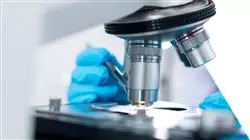University certificate
The world's largest faculty of nutrition”
Description
Become an expert in Food Biology and Microbiology! This postgraduate certificate program will provide you with the skills necessary to understand how microorganisms affect food safety and quality”

Today, the food industry is facing increasing challenges in terms of the safety and quality of its products. Biology and microbiology are essential fields of study for understanding the diversity of organisms present in food and how they can affect human health. That is why it is essential to have professionals trained in Fundamentals of Biology and Microbiology in Food Industry.
The reason for the need for a postgraduate certificate in this subject is that the knowledge and skills acquired in this TECH degree allow students to understand the biological and microbiological processes involved in food production and preservation, as well as in the prevention of food-borne diseases. In addition, knowing the different microorganisms that may be present in food and knowing how to control them is essential to ensure the safety and quality of food products.
During the postgraduate certificate, students will acquire knowledge about biological and microbiological diversity, population ecology, the role of nutrition in plants, the different types of microorganisms, their growth and control, bacterial genetics and taxonomy, microbiological immunology and epidemiology and prophylaxis of foodborne diseases. In addition, they will learn about the main microorganisms of food interest and their implication in the production and preservation of food.
The program's methodology combines theoretical classes with practical sessions, allowing students to put the acquired knowledge into practice. In addition, at the end of the postgraduate certificate program, students will be prepared to apply the concepts and techniques learned in their work environment and contribute to the improvement of food product safety and quality.
With this degree you will learn about biological diversity, microbial control and staining techniques. Sign up now and become a highly skilled professional in the food industry!”
This postgraduate certificate in Fundamentals of Biology and Microbiology in Food Industry contains the most complete and up-to-date scientific program on the market. The most important features include:
- The development of case studies presented by nutrition experts focused on the Fundamentals of Biology and Microbiology in Food Industry
- The graphic, schematic, and practical contents with which they are created, provide scientific and practical information on the disciplines that are essential for professional practice
- Practical exercises where self-assessment can be used to improve learning
- Its special emphasis on innovative methodologies
- Theoretical lessons, questions to the expert, debate forums on controversial topics, and individual reflection assignments
- Content that is accessible from any fixed or portable device with an Internet connection
Don't miss the opportunity to improve your skills and increase your job opportunities in the food industry with the development of this postgraduate certificate program”
The program’s teaching staff includes professionals from sector who contribute their work experience to this educational program, as well as renowned specialists from leading societies and prestigious universities.
Its multimedia content, developed with the latest educational technology, will provide the professional with situated and contextual learning, i.e., a simulated environment that will provide an immersive education programmed to learn in real situations.
The design of this program focuses on Problem-Based Learning, by means of which the professional must try to solve the different professional practice situations that are presented throughout the academic course. For this purpose, the student will be assisted by an innovative interactive video system created by renowned experts.
In the course of this degree you will discover the importance of biodiversity in ecosystems and how it affects food production"

You will learn to apply the principles of Biology and Microbiology in the Food Industry to improve food quality and safety"
Objectives
Through the study of the biological and microbiological aspects of food processes, students will be able to develop skills and abilities that will allow them to understand the dynamics of the ecosystems and communities involved in food production and preservation. In addition, the Diploma seeks to foster ethical attitudes in relation to environmental balance, promoting the sustainable use of natural resources and the application of good laboratory practices in the handling and analysis of microorganisms. In this sense, the objective of the program is to provide comprehensive training that allows students to understand and apply concepts in the food industry.

During the development of this postgraduate certificate you will acquire practical skills in the use of laboratory techniques for the identification of microorganisms in food”
General Objectives
- Develop ethical attitudes about the environmental balance that should exist in all food production and research processes, through the study of community and ecosystem dynamics
- Identify and understand Biology as an experimental science through the application of the scientific method
- Recognize the levels of organization of prokaryotic and eukaryotic microorganisms, as well as relate their main structures to their function
- Identify the differential nature of acellular organisms (viruses, viroids and prions) in terms of their structure and mode of replication, with respect to eukaryotic and prokaryotic cell models
Specific Objectives
- Broaden your knowledge of cell structure and the differences between prokaryotes and eukaryotes, as well as the differences between animal, plant and fungal cells
- Acquire essential knowledge about the main functions of plants in terms of water economy and mineral nutrition, their transport systems, reproductive strategies and their relationship with the environment
- Basic knowledge of the main primary and secondary metabolites of interest for Food Science and Technology
- To know and apply knowledge about plants on physiological aspects that are useful in food technology, such as gas exchange, respiration, primary and secondary metabolism
- Acquire general knowledge of animals of interest for Food Science and Technology, their behavior and fundamentals of their exploitation
- Acquire basic knowledge and know how to apply it to population growth and the sustainable exploitation of natural resources
- Learn interesting points about plant development and its regulation by hormonal and environmental factors
- Understand the basis of microbial pathogenicity and the defense mechanisms of the human body against existing pathogens
- Acquire basic knowledge of epidemiology and prophylaxis
- Know the main techniques and strategies for the inhibition, destruction or elimination of microbial populations
- Acquire the basic skills to handle and analyze microorganisms, following the guidelines of good laboratory practices
- Acquire and handle the appropriate scientific terminology
- Recognize and understand the different types of microbial metabolism and their nutritional requirements, linking it to their development in different types of food
- Know and interrelate the main mechanisms of genetic exchange in microorganisms and their application in food biotechnology

You will learn to identify the different types of microorganisms present in food and how to control their growth to ensure food safety thanks to this qualification”
Postgraduate Certificate in Fundamentals of Biology and Microbiology in the Food Industry
The food industry is one of the most important and sensitive sectors of our society. Food quality is fundamental to ensure the health and well-being of consumers, as well as business success. Therefore, it is essential to have professionals trained in the fundamentals of biology and microbiology involved in the processing and preservation of food products. The Postgraduate Certificate in Fundamentals of Biology and Microbiology in the Food Industry provides a solid training in these aspects, from a scientific and practical perspective.
The Postgraduate Certificate in Biology and Microbiology in the Food Industry provides a solid training in these aspects, from a scientific and practical perspective.
The program studies the biological processes involved in the production, transformation and preservation of food, as well as the microorganisms involved in the fermentation, preservation and deterioration of food. In addition, topics such as food hygiene and safety, current regulations and quality management systems are addressed. All this from a multidisciplinary perspective that allows the student to understand the technical and legal aspects involved in the food industry. The knowledge acquired in this program is essential for those seeking to develop their professional career in this sector, whether as technicians, analysts, inspectors or quality managers.
The program is designed for those seeking to develop their professional career in this sector, whether as technicians, analysts, inspectors or quality managers.
Become an expert in microbiology applied to the food industry
Microbiology is a key discipline in the food industry. Microorganisms are present in all stages of food production and preservation, and their knowledge is essential to ensure food safety and quality. The Postgraduate Certificate in Fundamentals of Biology and Microbiology in the Food Industry offers specialized training in this field, providing the knowledge and tools necessary to understand and apply microbiology in practice.
The Postgraduate Certificate in Microbiology and Microbiology in the Food Industry offers specialized training in this field, providing the knowledge and tools necessary to understand and apply microbiology in practice.
The program focuses on the study of the different groups of microorganisms present in food, from bacteria to viruses and fungi, and their role in the fermentation, preservation and alteration of food products. In addition, the microbiology of food is addressed in relation to public health, analyzing the most relevant pathogens and the diseases they can cause. The knowledge acquired allows the student to identify the most important microorganisms in the food industry, to apply the necessary control and prevention techniques and to evaluate the microbiological quality of food products. All this from a scientific and practical perspective, essential for any professional who wishes to specialize in food microbiology.
"







